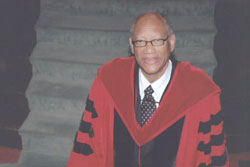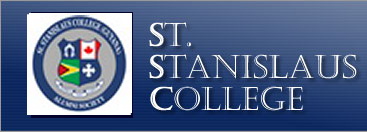
Justice Vibert Lampkin to Receive Doctorate Degrees at Spring Convocation
 York University President and Vice-Chancellor Mamdouh Shoukri has announced that Osgoode will have two distinguished Honorary Doctorate recipients at its upcoming Spring Convocation: The Honourable Justice Vibert A. Lampkin and Osgoode Professor Emeritus Paul C. Weiler.
York University President and Vice-Chancellor Mamdouh Shoukri has announced that Osgoode will have two distinguished Honorary Doctorate recipients at its upcoming Spring Convocation: The Honourable Justice Vibert A. Lampkin and Osgoode Professor Emeritus Paul C. Weiler.
Justice Vibert A. Lampkin is a recently retired judge of the Ontario Court of Justice. Throughout his career, he earned a reputation as a leader of the court, a trailblazer and a mentor to the many lawyers who appeared before him. Born in Guyana, he earned his first law degree from the University of London in 1957 and practised in Guyana until1967. He was called to the Ontario Bar in 1969 and earned his Master of Laws degree from Osgoode Hall Law School in 1977. He practised with the firm Rosenfeld, Schwarz, Malcolmson, Lampkin & Levine until 1982 when he was appointed to the Provincial Court (Criminal Division) (now the Ontario Court of Justice). He was one of the first black judges in the province. Until his retirement this year, he served in Newmarket, where he was known for his knowledge of the law, civility and contribution to the body of criminal law, with 286 reported cases. Everyone who has appeared or worked in his court was aware of his respect and compassion for people. Justice Lampkin was awarded a Doctor of Laws, honoris causa,by the Law Society of Upper Canada in 2008.
Professor Emeritus Paul C. Weiler is one of North America’s foremost labour law scholars. He is a 1964 graduate of Osgoode Hall Law School and became a professor of law at Osgoode following his completion of an LLM at Harvard University in 1965. After serving as Chair of the B.C. Labour Relations Board in the mid-1970’s, he was appointed as a Professor at Harvard and only just recently retired as the Henry J. Friendly Professor of Law. He served as legal advisor to Prime Minister Pierre Trudeau and was one of the key architects of the “notwithstanding clause” in the 1982 Canadian Charter of Rights and Freedoms. His first book, In The Last Resort (1974), was a pathbreaking book that established an entirely new form of legal scholarship in Canada, making his expertise in Constitutional Law world-renowned. While at the B.C. Labour Relations Board, he developed and administered a modern, progressive Labour Relations Code, which has had major influence on labour law across Canada. After his appointment at Harvard, he was selected by President Bill Clinton to serve as Chief Counsel to the U.S. (Dunlop) Commission on the future of Worker-Management Relations. In 1990, he was elected as a member of the Royal Society of Canada.
Source: osgoode.com

